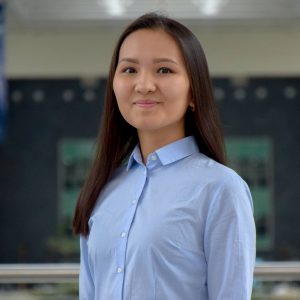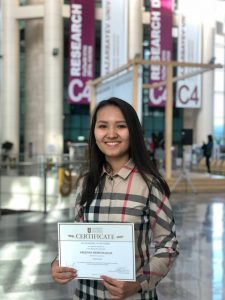A senior student of SSH got into Harvard: Interview with Aruzhan Meirkhanova

Introduction. Tell us about yourself
A: I am a senior student studying political science and international relations. My research interests include Russian foreign policy, “hybrid warfare,” Belt and Road Initiative, and Central Asian politics.
Q: Why did you choose PSIR major?

A: I had a strong prior interest in politics, but I had not previously considered that I would specialize in PSIR. The course on Humanities and Social Sciences during the Foundation Year Program, where we discussed the pressing socio-political and economic issues of the day, proved to be an eye-opening and transformative experience. During my first semester as an undergraduate, I took introductory courses on Comparative Politics and IR, which only reinforced my interest in political science and consolidated my decision to specialize in this field. With the benefit of hindsight, I can tell that this was one of the most important and correct decisions I have made.
Q: What was your student life like?
My student life was pretty exciting and diverse. During my first years at NU, I played for the Women’s Football team and a member of the Intellectual Games club. Afterward, I joined major-related student organizations, such as MUN and APSS. These student clubs helped me develop leadership and organizational skills. During my third year, I was a vice-president at APSS, and we, as a team, organized the first Parliamentary Simulation at NU. This was one of the most valuable experiences in my student life. I was delighted to see how students engaged in conversations to develop constructive solutions to the relevant socio-economic problems in our country.

People have certainly been the best part of my experience at NU. At NU, I have met many students who have skillfully combined their studies with active social life, volunteering, and jobs/internships. Studying amidst such talented, motivated, and socially responsible students has inspired me not only to perform well academically but also to strive to make an impact. I am very grateful to this university for having met my friends, who made the university experience intellectually rewarding, socially valuable, and full of fun. It has also been a privilege to take classes from and work with NU faculty. Special thanks to the professors at the PSIR department, who have helped shape my research interests, develop valuable research skills, and guided me throughout my academic journey. Undoubtedly, I am thankful to the people, professors, and friends at NU, who have contributed significantly to my academic and personal growth.
Q: Do you have any favorite courses?
I enjoyed the overwhelming majority of my PSIR courses; yet if I were asked to point out three of them, I would probably mention the following:
The course on the Politics and Governance of the Russian Federation, which I took in my third year, was instrumental in shaping my subsequent research interests. We covered topics as diverse as Russia’s economic transition, federalism, civil society, domestic challenges facing Russia, and the country’s foreign policy. The course helped me find specific research areas that interest me the most and have since driven my eagerness to write Russia-related papers for my other classes.
I also enjoyed the courses on International Political Economy (IPE) and Foreign Policy Analysis (FPA) among my favorites. IPE helped me get acquainted with the foundations of the liberal world order, the evolution of trade regimes, monetary relations, and the politics of development – the topics critical for each IR student. I very much enjoyed FPA as well, since we were assigned the seminal articles from IR literature and studied how states use economic sanctions, foreign aid, international organizations, etc., as their foreign policy tools.
Q: You have studied online for almost 3 semesters. What helps you with online studying?
I think it would be disingenuous to state that online studying has been a uniformly smooth experience for me. I have certainly experienced periods of declining motivation, lack of social engagement, as adaptation proved uneasy. It was initially difficult for me, as for many other students, to make peace with the idea that Zoom replaced classroom, office hours, and interactions with peers. Yet, I also understood that I needed to prepare my graduate applications, which has helped me stay motivated.
Concurrently, I came to realize that online studying entails a lot of responsibility – the realization that you “own” your time becomes more palpable. The pandemic revealed that adaptability, time management, and flexibility are crucial in such an uncertain world, so I have tried to nurture these skills throughout my online studying experience.
At the same time, I want to note that the “new normal” has offered many advantages – online courses, conferences, and panels organized by major world universities became even more accessible. Students could also take GRE and TOEFL at home. More opportunities emerged for planning your day as you see fit and for spending more time with the family. I want to mention that my family has supported me during the online learning and application process, for which I am very thankful.
Q: When and how did you decide applying to Harvard? How did you start your preparation?
I made this decision after talking to my friend, who graduated from NU several years ago with a degree in Political Science and International Relations. While I did not initially consider applying to top schools, it took a single phone call to alter my decision. Having been inspired by his story and our conversation, I decided to apply to Harvard and several other schools in the U.S., Canada, and Europe.
My preparation started in the late spring of my third year. Deadlines typically vary based on the program, but for my universities, the deadlines were in December and January, so I made a concrete action plan early on. I registered for GRE, which I took in August, after having prepared for around two-three months. Then, I took TOEFL in September and finalized my list of universities in early November. Concurrently with all of these exams, I was working on my statements of purpose, writing sample, and portfolio (CV, research experience, publications).
Q: Can you please tell us more about your program at Harvard?
I was admitted to the REECA (Regional Studies: Russia, Eastern Europe, and Central Asia) Master’s program at the Davis Center. This is an interdisciplinary program, where students develop regional expertise by studying politics, languages, culture, history, and societies of the region; strengthen their research skills and knowledge of methods. During the program, I hope to work with the Davis Center’s distinguished faculty and learn a lot by studying alongside student-colleagues with diverse backgrounds. The curriculum is flexible in that it can be designed to meet each student’s needs. There is also an excellent opportunity to cross-register for some courses from other Harvard Schools (Kennedy School, Law School), Fletcher School at Tufts, and MIT. In short, there are a lot of opportunities for growth at the program, which helps prepare students for both academic and professional careers.
Q: Where did the admission’s committee focus while reviewing your application?
It is difficult to say with certainty what specifically made my application stand out. I personally think that admission committees usually take a holistic approach and look at every component of student application as a part of the whole. Recommendation letters, transcripts, test scores – all matter a lot, and for my program, I think that the research experience was significant, too. During the interview with another top school, I was delighted to hear positive feedback about my writing sample, so I suppose this document has been an important part of my application, too.
Q: How did your studying at SSH help you on your way to going to Harvard? Perhaps you have courses that helped you with your writing skills or analyzing?
I am convinced that critical thinking and writing skills are crucial for each student, and my experience at NU has undoubtedly helped me develop these skills. As I said earlier, the faculty members have played an essential role in encouraging my academic growth in class and during office hours.
I did not take any specific writing courses except for the “Rhetoric and Composition,” albeit I had many writing-intensive courses (in PSIR, Anthropology, History) throughout my undergraduate career. I strongly recommend attending the Writing Center, where the instructors provide constructive and detailed feedback on coursework and motivation letters/statements of purpose.
Q: Where do you see yourself in 10 years? In what fields do you want to work?
As of now, I intend to pursue an academic career and enter a Ph.D. program in political science. Yet, in an ever-changing world like ours, I don’t exclude the possibility that things may turn out differently, and I will end up working in a professional field. Regardless of whether it will be academia or a professional world, I would want to continue doing research and contribute to the production of knowledge about our region. I sincerely hope that my experience at Harvard will help me in progressing towards this goal.
Q: What inspires you to be a better version of yourself? What inspires you to study?
People. At NU, there is no scarcity of people who can motivate and inspire – alumni, professors, my peers – all have their own stories that have a lot to teach in one way or the other. I have also grown up in a family, which inculcated in me the value of education, and I think this has had a significant impact on my mindset as well.
Apart from external sources of inspiration, I also try to maintain an internal motivation. I once read the quote by Oprah Winfrey, who said that the key to making your dreams come true is “to focus not on success but significance.” As I progress with my career, I hope to contribute to the research about the region, and I believe that the production of knowledge has an intrinsic societal value. This belief helps me keep studying and not giving up when I have temptations to do so.

Q: Any pieces of advice for future students of SSH? What to know, what to focus on, etc.
I came to realize that good writing necessitates reading much – both within and beyond the classroom. As a political science student, I would also suggest that students subscribe to reputable newspapers and journals that will help keep track of what is going on in our dynamic world.
Join student clubs and organizations – these provide an excellent platform for finding friends, joining a network of like-minded individuals, and developing valuable soft skills.
Don’t be afraid to reach out to ask for a piece of advice – there are many people out there, including professors, alumni, peers, grad school students, who would be glad to help. I had two brilliant mentors, who constantly guided me in my application process, and I also contacted some Harvard students to get to know more about the program. I was delighted to realize that so many people kindly agreed to respond to my queries.
Always remain open-minded and be ready that some of your previous beliefs might change once you get exposed to various perspectives. This is, in my opinion, the beauty of education.
Last but not least, do not be afraid to “shoot for the moon.” One year ago, I wouldn’t have believed that I would apply to Harvard and other top schools for my Master’s degree. Looking back, I realize that aiming high has not only been a wise strategy but a valuable lesson, which taught me that hard work, perseverance, and belief in yourself pay off.



